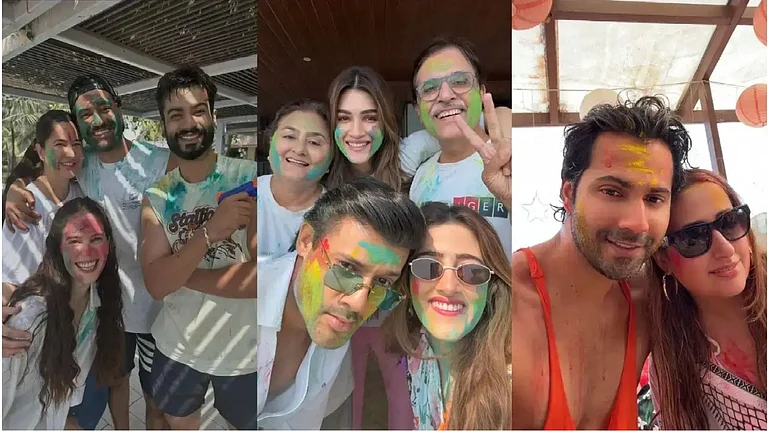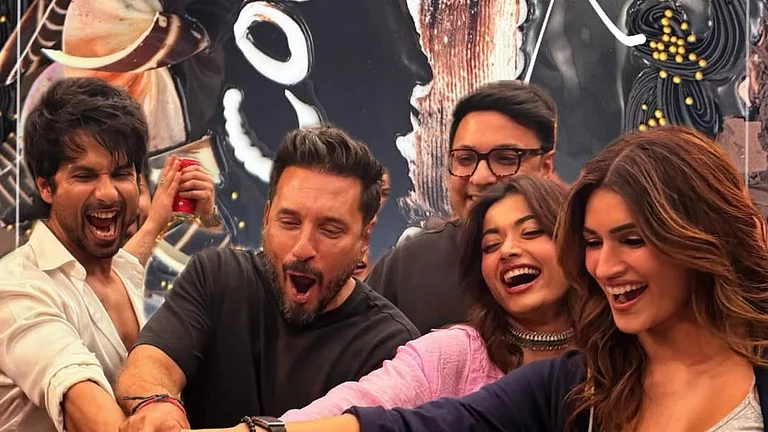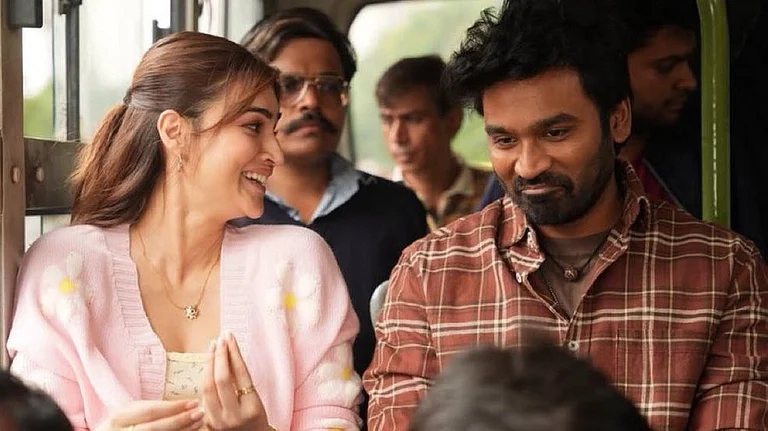
Summary of this article
Tere Ishk Mein is written and directed by Aanand L. Rai.
The film stars Dhanush and Kriti Sanon in lead roles.
Tere Ishk Mein tells the story of an entangled one-sided, guilt-driven romance along with a patriotic tale, clumsily put together.
Love and war go hand in hand in Aanand L. Rai’s Tere Ishk Mein (2025) where it’s always DU students taking part in violent political activities while simultaneously getting involved in a love triangle. Sounds familiar? With titles such as Saiyaara (2025) setting new commercial records through their hyper-charged romantic narratives, a familiar pattern has begun to reappear: emotion eclipsing logic, coherence or even character design. Despite the formula’s popularity, Tere Ishk Mein struggles to sustain its fragile plot, even with strong performances from Dhanush, Prakash Raj and Kriti Sanon.
The landscape for “romance” films has shifted a lot in the last decade and not necessarily for the better. Women are often reduced to collateral in narratives driven by male aggression. These films seem to assume there’s only two ways to love women—both inclusive of violence—by controlling her or by guilt tripping her. Tere Ishk Mein focuses on the latter. Rai’s newest release associates itself with the world of Raanjhanaa (2013), a film that followed a young man’s consuming infatuation until it dismantled him completely. Following the same footsteps as Kundan from the earlier film, this Dhanush-starrer is not completely unwatchable but clumsy and deeply problematic at best.
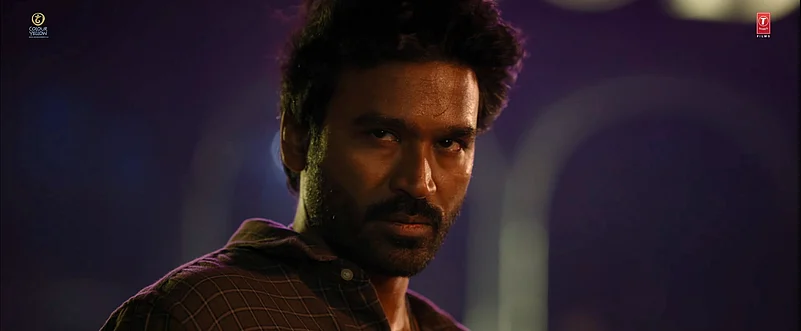
Marketed as “an A.R. Rahman musical,” the film at least grants its viewers a competent score. Beyond that, any sort of harmony is in short supply. The film presents itself as a heady mixture of genres, contorting the torment of a one-sided loverboy into a certain shade of patriotism that is as stubborn as his love—and destroying everyone else in the aftermath. The narrative then oscillates between the Leh Air Force station, where Shankar is now posted, and the DU campus, gradually unpacking the unresolved tension that keeps pushing both of the protagonists closer and closer to insanity.
The film centres on an unlikely pairing: a volatile, directionless law student and a driven PhD candidate. Shankar (Dhanush) falls for Mukti (Kriti Sanon) instantly, while she approaches him with clinical detachment, viewing him only as material for her psychology dissertation. The narrative depends on familiar binaries—good and bad, restraint and aggression, affection and hostility—as Mukti attempts to demonstrate that volatile, “alpha” men can be rehabilitated into gentler versions of themselves. Her PhD committee finds the hypothesis imaginative at best, delusional at worst. Their scepticism only fuels her resolve. The manic-pixie template is retooled into a clinical figure: a therapist-academic determined to “repair” the man she casually labels a gandi naali ka keeda. In striving to mould him into a model of refinement, she engineers a version of him that is far more troubling.
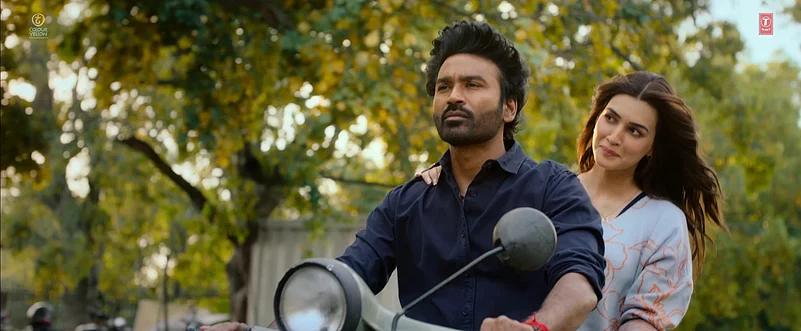
Bollywood has long relied on the tropes of military spectacle and the one-sided lovesick hero, yet Tere Ishq Mein manages to merge both tropes into a third worse thing. The trailer frames Dhanush as an Indian Air Force officer whose worldview appears restricted to a singular undeterred perspective at all times. He disregards instructions from senior officials, but is still introduced as “the best pilot we have.” The path that supposedly shapes him into this deshbhakt figure is built up with such embarrassing clumsiness that it undermines everything the film attempts to do.
Sanon’s performance here is much better than her previous roles—her character is simply too perplexed as what she wants and quite underwritten. The film presents its heroine as someone unsure of how to interpret intensity, framed as incapable of recognising or accepting the affection directed at her. Her hesitance is contrasted with the scale of the hero’s turmoil, creating a dynamic where she is eventually pushed toward submission—quite literally brought to his feet, pleading for his love. The connection appears quite engineered rather than earned, as though Rai hoped to receive reciprocal love back (at any cost, even logic) that he also orchestrated in his previous one-sided lover saga Raanjhanaa (2013)

Dhanush occasionally channels shades of angst from his role in Kuberaa (2025), though the effect dissolves under dialogue that leans into broad humour and an oddly juvenile tone. The conversations between characters hold an unintended sharpness, often unabashedly revealing not just flawed characters but truly problematic ones. A line from the trailer illustrates this perfectly: Mukti (Kriti Sanon) remarks that young girls may grow up imagining a prince, only to discover later that his affection cannot match the “saltiness of a labourer’s sweat.” The statement exposes the film’s uneasy handling of the worlds it tries to merge (and the worlds it doesn’t fully understand).
His only remaining family is his father— a mild-mannered notary played by the brilliant Prakash Raj, who keeps excusing his unlawful behaviours. The film also briefly detours to Banaras, where a priest-philosopher (Mohammed Zeeshan Ayyub) in a fleeting but striking appearance—delivers compact reflections on love, mortality and spiritual release. The premise is difficult to accept, given that Mukti is a trained psychologist capable of recognising the dangers of provoking a man already inclined toward emotional instability. Instead, she allows him to upend her judgement while she nudges him closer to the edge. The screenplay occasionally attempts to position Shankar as a victim, leaning on a predictable childhood wound. The guilt eventually pivots onto Mukti. Shankar’s need for an exit strategy finds an easy target in her, and the gaslighting takes its toll. She begins to doubt her instincts and re-evaluates her choices in navigating his volatility. The film frames every major interaction around ultimatums, as though negotiation were an extinct social skill.
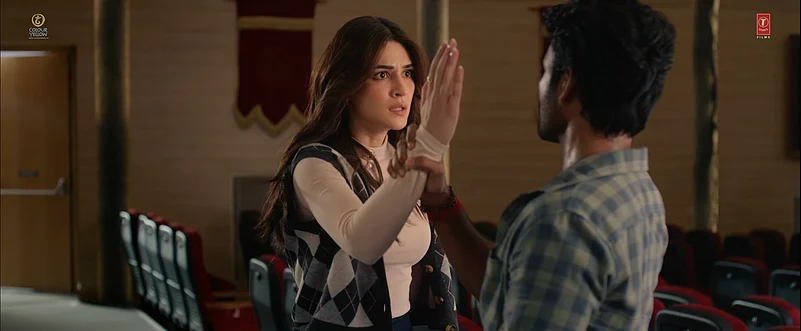
The film’s male authorship is unmistakable. It appears designed for men who fashion ambition only around the pursuit of a woman. Dhanush plays a character with no discernible goal outside his unresolved longing; his life is arranged around a static emotion. His attempt at clearing the UPSC examinations resembles a dramatized “thukra ke mera pyaar, mera intkaam dekhegi” gesture, aimed solely at impressing her father rather than contributing any substantial direction to his own future.
The film’s pacing is a rollercoaster that mostly forgets to thrill. Glimpses of strong sequences soar briefly before nosediving spectacularly—planes in the trailers would be jealous. Its attempt to juggle patriotism, romantic redemption, a dash of violence-meets-peace, and the man-child’s metamorphosis collapses under its own ambition. Each storyline fizzles just when it promises impact, leaving the audience more eager for the credits than the plot, quietly wondering if the next twist might actually stick—or at least make sense.




